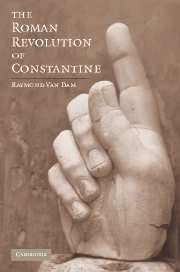Book contents
- Frontmatter
- Contents
- PREFACE
- ABBREVIATIONS
- Map
- Introduction: AUGUSTUS AND CONSTANTINE
- SECTION I A ROMAN EMPIRE WITHOUT ROME
- SECTION II A GREEK ROMAN EMPIRE
- SECTION III EMPEROR AND GOD
- Epilogue: ONE EMPEROR
- APPENDIX 1 HISPELLUM: DATE, TEXT, AND TRANSLATION
- APPENDIX 2 ORCISTUS: DATES, TEXT, AND TRANSLATION
- EDITIONS AND TRANSLATIONS
- BIBLIOGRAPHY
- INDEX
APPENDIX 2 - ORCISTUS: DATES, TEXT, AND TRANSLATION
Published online by Cambridge University Press: 05 June 2012
- Frontmatter
- Contents
- PREFACE
- ABBREVIATIONS
- Map
- Introduction: AUGUSTUS AND CONSTANTINE
- SECTION I A ROMAN EMPIRE WITHOUT ROME
- SECTION II A GREEK ROMAN EMPIRE
- SECTION III EMPEROR AND GOD
- Epilogue: ONE EMPEROR
- APPENDIX 1 HISPELLUM: DATE, TEXT, AND TRANSLATION
- APPENDIX 2 ORCISTUS: DATES, TEXT, AND TRANSLATION
- EDITIONS AND TRANSLATIONS
- BIBLIOGRAPHY
- INDEX
Summary
The best complete edition of the petition from orcistus and Constantine's responses is by W. M. Calder in MAMA 7:69–72, no. 305, with rather murky photographs in Plate 20. The English translation in Johnson, Coleman-Norton and Bourne (1961) 240–1, no. 304, is based on Calder's text. Chastagnol (1981a) 384–91, essentially reprints Calder's text and provides a French translation; Feissel (1999) 256–57, likewise reprints Calder's text, but also provides an improved edition of Document 1. The text printed and translated here combines Feissel's edition of Document 1 with Calder's edition of the other documents.
Earlier editions include Th. Mommsen, in CIL 3.1 (1873) 63–66, no. 352, and again (with O. Hirschfeld and A. Domaszewski) in CIL 3, Supplementum 1 (1902) 1266–68, no. 7000; Mommsen (1887) 316–18; H. Dessau, in ILS 2.1:526–27, no. 6091 (only Constantine's two letters); Abbott and Johnson (1926) 491–93, no. 154; and Riccobono (1941) 462–64, no. 95.
The dating of these documents covers the spectrum from exact to a bit speculative. The date for the first petition (Document 3) at the beginning of the process can be narrowed to sometime within a period of about eighteen months. The salutation of the petition addressed Constantine as “Maximus [‘the Greatest’], Victor, always Augustus.” According to Eusebius, after his victory over Licinius in September 324 Constantine took this commemorative title of Victor “as the most appropriate name for himself because of the victory that God had given him over all his opponents and enemies.”
- Type
- Chapter
- Information
- The Roman Revolution of Constantine , pp. 368 - 372Publisher: Cambridge University PressPrint publication year: 2007

